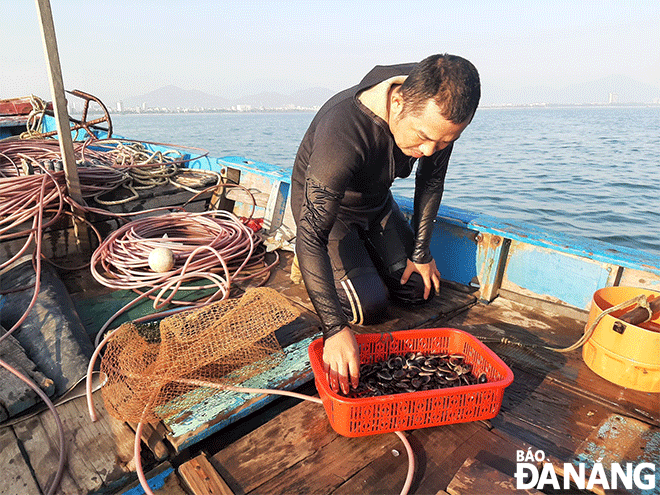Hunting of clam - real 'cash cow' for Da Nang divers
Hundreds of divers flock to the Han River and the Gulf of Da Nang in the namesake city every day in search of a species of hard-shell clam called ‘chip chip’, along with shrimp and crabs of all kinds. The catching of the so-called “cash cow” does help such divers make ends meet, even significantly improve their incomes.
 |
| Each diving trip brings fishermen income up tp more than one million VND. A local man is seen with ‘chip chip’ just caught during 15 minutes of diving in the waters near the foot of Phu Loc Bridge in Da Nang. Photo: KHANH HOA |
‘Chip chip,’ a Vietnamese onomatopoeia for the chirping sounds of birds, is what local Vietnamese call these black-and-white hard-shell clams native to the Han River and the Gulf of Da Nang. Interestingly, it is one of the most favourite dishes on the menu offered by local seafood restaurants and eateries.
The catching of ‘chip chip’ is not a piece of cake. As these clams normally hide themselves under muddy riverbeds, divers must submerge themselves by up to eight meters and use gloved hands in search of their prey.
At 5:00 am, Da Nang Newspaper reporters hitched a ride on a small boat owned by fisherman Pham Dat, 37, residing in Man Quang Bay apartment building, Nai Hien Dong Ward, travelling from Man Quang Bay straight to the nearby waters at the foot of Phu Loc Bridge in Thanh Khe District so as to witness first-hand the vibrant business happening day and night on the Han River.
At the age of 37, Dat has nearly 15 years of catching ‘chip chip’, which is also a time-honoured family career. He started learning how to dive when he was 15 years-old, and according to him, the toughest task is to kelp breathing under high water pressure.
The first diving sessions only dive about 10-15 minutes, at a depth of equivalent 5-6 adult arm spans, then gradually increasing to 20-30 minutes with a depth of 7-8 arm spans. From the water emerges Dat with a bag of harvested ‘chip chip’ in his hand.
According to Dat, summer is the time when diving for ‘chip chip’ is in the peak season when the sea water is clear, the wind is not big and the chips reproduce a lot. Every day, the diving team on Dat's boat comprises of about 5-6 people, harvesting a total of 30 - 50 kg of ‘chip chip’.
Meanwhile, in the winter, the output is less, with only 20 - 30 kg/day. Its price also goes up and down seasonally, ranging from VND 60,000 - VND 90,000 /kg, depending on size.
Every day, such divers like Dat gets VND 500,000-VND 900.000, excluding costs of the trip.
Particularly in 2019, when ‘chip chip’ season thrived, Dat earned nearly one hundred million VND per month. “Divers with good health and being not afraid to get dirty and exhausted, they can make money with profession”, Dat happily boasted.
Despite constant harvesting, the population of the clam species never seems to run out, as all divers follow the unwritten rule of collecting only grown chip chips and leaving the small ones for repopulation in a bid to conserve nature’s treasure.
According to incomplete statistics, there are currently more than 600 divers in Da Nang and the provinces of Quang Nam, Thua Thien Hue and Quang Binh practicing the catching of ‘chip chip’, 180 of whom are from Nai Hien Dong Ward, Son Tra District, Da Nang.
With abundant product resources and good development potential, the profession of hunting for seafood, especially ‘chip chip’, continues to be maintained by many young fishermen.
In the coming time, there will be tourist tours during which tourists accompany fishermen to hunt for seafood and enjoying the fresh-caught dishes onboard. From here, it can open up job opportunities, increase income for people who have maintained sea-based jobs in the city as well as a way to preserve traditional profession like the hunting of ‘chip chip’.
Reporting by KHANH HOA - Translating by A.THU